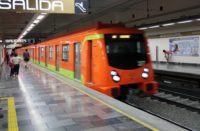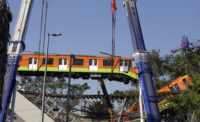Mexico City will seek an international structural expert to investigate the cause of a May 3 transit overpass collapse that left at least 24 people dead and dozens more injured.
The incident occurred about 10:30 p.m. along a section of Metro Line 12 just beyond the elevated Olivos station. According to eyewitness accounts, one of the structure’s concrete beams collapsed as a Metro train was crossing, sending rail cars plummeting approximately 16 ft onto an underlying highway.
At a press conference May 4, Mexico City Mayor Claudia Sheinbaum said the city will seek “an international company with certification both in metro and in structural matters to carry out an external technical expertise.” She added the local prosecutor’s office will also investigate the incident, and that the city would release a 2020 structural analysis of Line 12.
Built by a construction consortium that included Mexico’s Ingenieros Civiles Asociados (ICA) and Carso Infraestructura y Construcción (CICSA), and Alstom Transport of France, Line 12 is the newest in Mexico City’s subway network, with both underground and elevated sections along its 12.6-mile route on the city’s south side. The overpass collapse occurred on a mostly elevated section of Line 12 that began construction in 2008 and cost $1.7 billion to complete.
Since beginning operations in 2012, Line 12 has been beset with problems, beginning with a partial 18-month closure in 2014 for track and structural repairs. An investigation by Mexico City’s comptroller identified numerous instances of defective construction materials and questionable project supervision, leading to criminal prosecution of several senior project officials, including Enrique Horcasitas, the former head of Proyecto Metro, the agency that oversaw Line 12’s construction.
Line 12 suffered another blow in 2017, when a 7.1 magnitude earthquake left cracks in several columns supporting the elevated section encompassing the area of the May 3 collapse. The section was closed for several months to carry out structural repairs.
Citing lingering concerns about Line 12’s checkered history, Mexico’s president, Andrés Manuel López Obrador, has promised transparency throughout the investigation. “Every day we are going to be providing information about this unfortunate event,” he said.
Marcelo Ebrard, the country’s Secretary of Foreign Relations and who, as Mexico City’s mayor during construction of Line 12, came under suspicion for the project’s woes, also promised full cooperation with the investigation.
Writing on Twitter, Ebrard said, “I put myself at the entire disposal of the corresponding authorities for whatever is necessary to clarify what happened and establish responsibilities. I share the outrage of society at what has happened.”
Mexico City’s Metro is second only to New York City’s as the busiest subway system in the Western Hemisphere. In 2019, Line 12 carried nearly 370,000 passengers daily. A 3.5-mile extension is scheduled to open in 2022.





